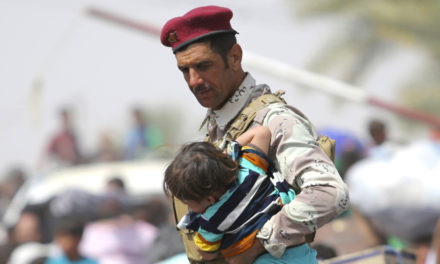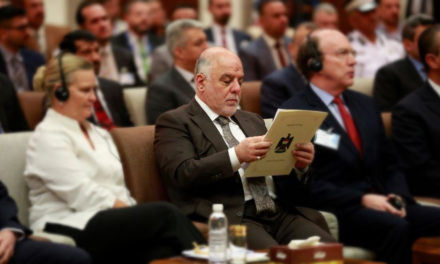(Art by Maytham Radhi)
One of the things Iraqis were deprived of during Saddam’s reign was their ability to criticize. While people around the world cannot and probably never will be able to imagine how it was under Saddam, Iraqis remember well what it meant to criticize the leader, the party, or the state.
Imprisonment and torture were the ‘lighter’ consequences of criticism, without getting into detail about what was happening in Saddam’s prisons and how ‘innovative’ the prison management was when it came to torturing people.
More than often, however, criticism of political nature ended up in execution or worse, vanishing without a trace. It also meant that family, relatives, and friends were doomed, that they would remain under surveillance, be subject to harassment, and if they’d make any mistakes, complain publicly or even privately about their miserable situation (the famous rule of thumb in Iraq was that ‘the walls have ears’), they’d end up just like the person who started it. In other words: in the pre-2003 Iraq, if you thought about criticizing the regime, you had not only to worry about yourself but also about the consequences of your action on your family, relatives, and friends. This was one of Saddam’s ways to keep the masses in check.
After 2003, people were finally allowed to practice what they were deprived of, which is freedom of speech. However, although no democracy can take itself seriously without a heavy dose of it, we Iraqis and those non-Iraqis who are understanding and fair realize very well that not all criticism related to Iraq is constructive or even meant well. People criticize the situation in Iraq for many different reasons.
There are the ones who are genuinely concerned about the situation and really are hoping that through their critique they can achieve change. However, deep down they realize that they are preaching to the choir and that not much is changing.
On the other side of the spectrum are those who themselves were, or have a family member who was part of Saddam’s regime that was cracking down on people speaking up. Many of them suffer from nostalgia about ‘the old days’, especially if they or their family members lost position and prestige they had in the pre-2003 era. Certainly, these people are going to be ‘critical’ about almost everything in the New Iraq, exploiting to the fullest the freedom of speech they were denying people during Saddam’s time.
Some of those ‘nostalgics’ have been employing a more organized and targeted approach to critique, engaging early after 2003 in professional media efforts to take down the new system with the support and financing of countries who saw in the New Iraq as a danger to their own regimes, while those supporting the New Iraq were scrambling to establish proper media organizations that defend and contribute to rebuilding it.
We also have people who criticize the New Iraq because they want to justify breaking up from it, although realizing that they suffer from similar problems in their current arrangement and will probably face the same or worse in their proposed future state. While engaging vehemently in criticizing Iraq, they themselves admit sometimes that regardless of Iraq’s problems, their aspiration for an independent state will remain even if the situation in Iraq improves.
We have people who are trapped in what I call a ‘brain loop’ related to the ‘mechanism of history’, which they try to superimpose on the whole country, claiming that there is no hope for Iraq because apparently the country is historically doomed and wired to ‘reset’ itself the moment it achieves some progress. To support their arguments, they lay out some historical comparisons that would make any historian clench their teeth and curse the day social media became part of their life.
We have people who call themselves analysts criticizing the New Iraq because it made a decision or witnessed a development that they didn’t see coming, rendering their well-woven theories about the situation into a bunch of feathers caught in a whirlwind. Of course, this is bad for business, so they start taking it out on Iraq and its ‘instability’ by criticizing those they think are responsible, declaring the country as a ‘hopeless case’.
Then, we have people who criticize the New Iraq because they noticed that their favorite ‘social media influencers’ like to do so. They join the chorus of criticizers who seem so intellectual and sophisticated when they dissect Iraq’s political system and its society with the precision of a neurosurgeon, quoting ‘Ali Al-Wardi’ to support their half-baked arguments, and then abruptly leave the operation table – in this case their social media walls – without suggesting any real non-cliché solutions for the situation. Other Iraqis then share their post or develop their own ‘lighter’ version of the critique. What these ‘social media surgeons’ have done is only contributing more to the epidemic of ‘negativity’ in Iraq’s public opinion.
Last but not least, there is this group of people who actually are in the position to make a change, yet its members join the critiques in an attempt to fool the masses that they are actually not responsible for what is happening. Worse, there are today people who are critical about issues they actually contributed to, if not caused in the past.
All this renders the group of casual Iraqis who are grumpy by nature and love to use social media as a space to vent their anger by being critical the minority.
All this criticism, whether good or bad, informed or clueless, genuine or agenda-driven, merges into this single mess of hopelessness that hangs like a dark cloud over the minds, hearts, and souls of Iraqis, raining negativity on them every single day of their lives…
Obviously, trying to stop people from being critical is not only impossible but also problematic. As said, nothing will change without critical thinking. Furthermore, nobody can control what people say on social media, although there are ways like character assassination or online bullying that might make some people back off from certain narratives or at least make it difficult for them to get their messages out. However, how democratic would that really be? Wouldn’t that counter the spirit of freedom of speech, where one would be using the techniques and technologies that freedom of speech depends on to do the opposite and silence others? How much different would that be from what Iraq’s adversaries are doing right on MSM, paying huge sums of money to make it happen? Wouldn’t Saddam do the same if he lived in the age of social media?
Furthermore, it would not make much sense to obsessively engage in categorizing critics and then label them. People have so many motives to criticize, comment, and predict. Making tough judgments based on what people post on social media or say on TV sometimes backfires, without meaning that it is impossible to identify on the long term for what a specific person or organization stands for. But when the goal is to achieve change rather than judge people, other approaches are required.

Muhammad Al-Waeli
Muhammad Al-Waeli is an Iraqi commentator on political and social issues. He is currently doing a PhD in Human Resource Management and is interested in politics, media, and development.










